In the bustling city of Nagpur, 17-year-old Tejas Pugalia, a class 12 student at Centre Point School, is driven by a simple desire to help others. What started as tutoring a friend from a marginalised community soon uncovered a much larger issue.
It all began in 2022 when he decided to help the son of a household maid with his studies. The boy, younger than Tejas, lived in a world where access to education was a challenge, especially in rural areas. “As I tutored him, I learnt about the struggles children face in government schools,” he tells The Better India. “One of the most alarming issues I learnt was that many children didn’t attend school during the monsoon season because they didn’t have bags and their books would get ruined. Instead, some had to take up household chores or get involved in child labour, creating a gap in their education.”
The 17-year-old was deeply moved as he realised that the lack of a school bag was preventing children in government schools from continuing their education during monsoons. It was a problem that he wanted to solve sustainably. With his curiosity piqued and his heart set on helping, he thought about the possibility of upcycling textile waste, a serious environmental issue, and using it to create school bags that would be eco-friendly and affordable.
How Threads4Good came to life
This was the moment that stirred the idea for ‘Threads4Good’, an initiative founded on empathy and the belief that communities can unite to solve the world’s most pressing problems.
He knew that this was not a task he could tackle alone and understood the importance of collaboration. “I needed help, but had no idea where to start. I turned to my connections on LinkedIn, and was amazed by the response,” he shares. “Soon, I had a group of like-minded volunteers from all over India, eager to be a part of this cause.”
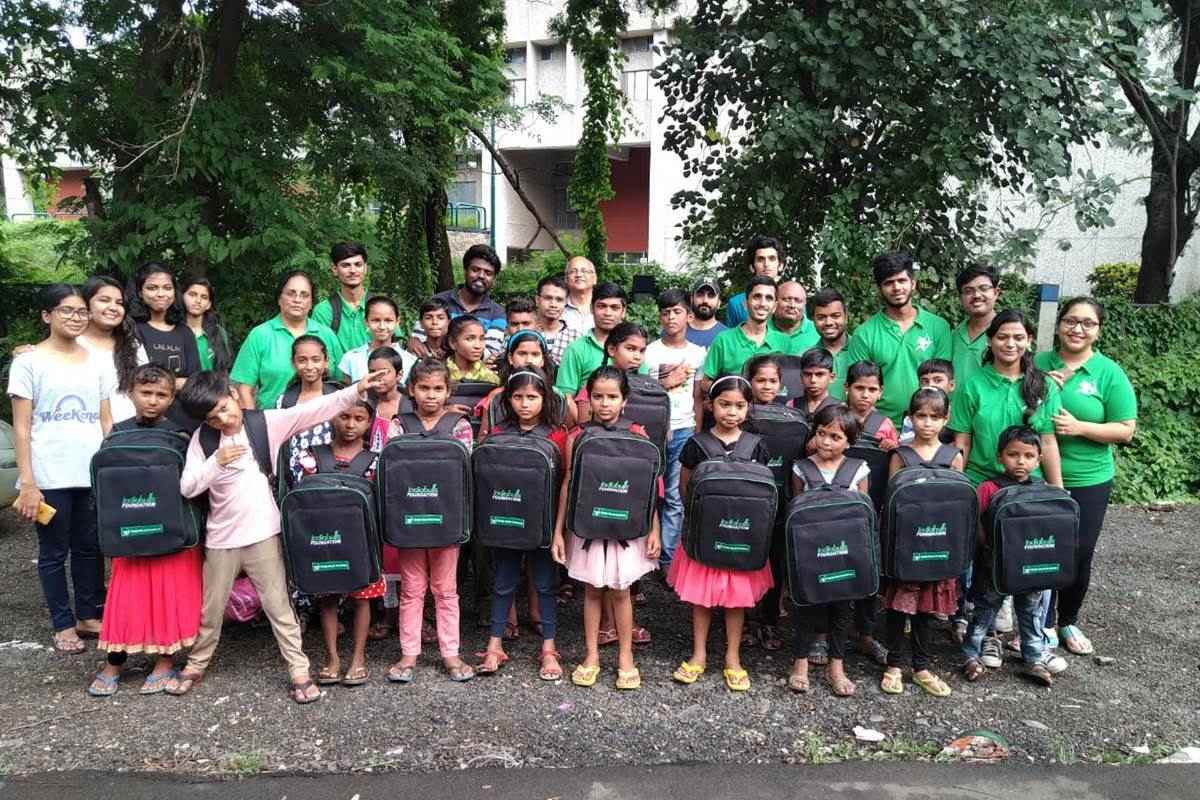
In August, Tejas assembled a team of passionate volunteers who shared his vision of making education accessible for all government school children. He partnered with the Robin Hood Army to identify underprivileged children in need of school bags.
“We visited several government schools and conducted surveys with just a few questions. The most important one was, ‘Do you attend school during the monsoon season?’ The answer was either ‘yes’ or ‘no’. For those who answered no, we asked the reason behind it. The main problems we found were lack of transportation and, more significantly, the lack of proper school bags,” he explains.
The next thing he focused on was creating sustainable school bags. He organises textile waste collection drives, often partnering with his school to make the process easy. “We collect everything from old t-shirts to industrial textiles, and the school community plays a big role in gathering these materials,” he explains.
Once the waste is collected, it is sent to upcycling units, where it is transformed into usable fabric without using any water, pollutants, or chemicals. For example, in Nagpur, he works with Agrawal Textile Mill, but each city has its own dedicated upcycling unit. “The textile waste is processed into large sheets of fabric, which are then sent to NGOs where marginalised and disabled workers stitch the bags,” he says.
“We’ve kept the design of the bags consistent across India, wherever we work. We also conduct regular quality checks to ensure the bags are durable. Many of our volunteers have used these bags to test their strength and longevity,” he adds.
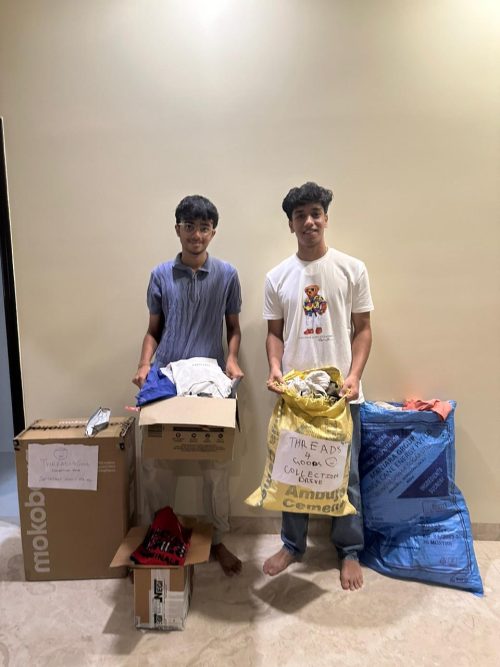
Conquering the hurdles to expand the mission
Another challenge the teenager faced in his mission to help the marginalised was finding individuals to assist with the bag-making process. “Initially, I reached out to disabled people and those from the underserved communities, but many were reluctant to join,” he recalls. “They were sceptical about the idea of working with children. That’s when we decided to collaborate with NGOs that already supported these individuals, helping to build trust and show the long-term potential of the initiative.”
His determination led him to organisations like the SunLink and Helplink Foundation, which works with people with disabilities. With the foundation’s support, the Threads4Good team held orientation sessions to explain the purpose of the initiative and its long-term benefits to society. He vividly recalls the first training session, “We had to assure them that the work would be both financially rewarding and meaningful. It took a few sessions, but soon enough, people began to believe in the cause. We started with two workers and then other people joined.”
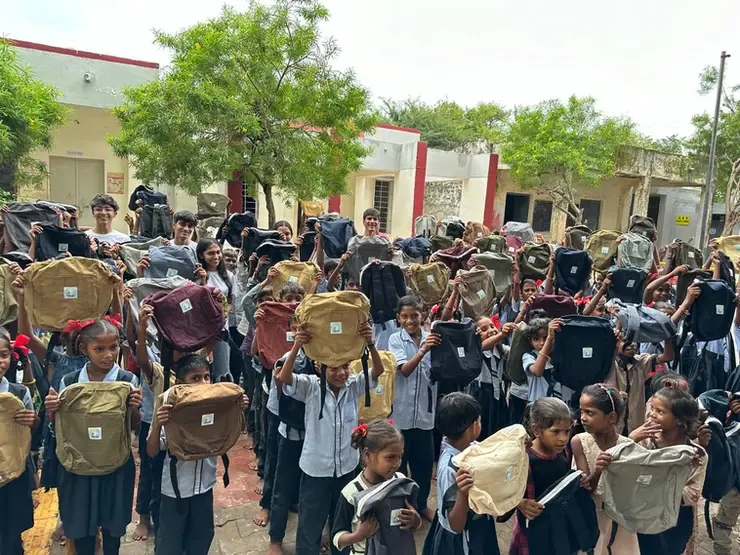
One of those workers was Bhavishya, a 31-year-old man diagnosed with albinism, which had severely impaired his eyesight. He had faced discrimination his whole life and had struggled to find stable work. “When I first heard about Threads4Good, I was unsure about working with them,” he shares.
“But once I started working, I realised this wasn’t just about earning money, it was about being a part of something bigger than myself. I’ve learnt so much from this initiative, and it has helped me become financially independent. I earned around Rs 30,000 in the previous year and started investing in mutual funds and have seen my savings grow,” he adds.
“We connected with the underprivileged individuals through word of mouth, reaching out to people I knew who worked as household help in our area,” says Tejas. “Initially, we worked with a local tailor who trained the underprivileged and disabled individuals to stitch the bags efficiently. This training was crucial in ensuring that the bags were made with the right skills and quality,” he explains.
Community impact of Threads4Good
Threads4Good has had a lasting impact on the lives of underprivileged women and disabled individuals who work with the organisation. Beyond teaching them to stitch, the team has organised various sessions to equip them with valuable life skills like learning English, financial literacy, and personal hygiene practices.
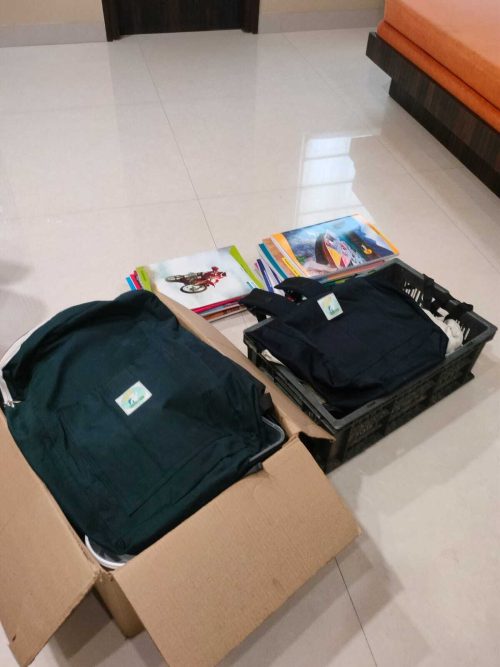
“Many marginalised and disabled individuals couldn’t afford basic necessities, like toothbrushes, but now they have the means to buy what they need. Some had been separated from their families for years and lacked the resources to reunite. After joining us, they were able to visit their loved ones with the money they saved. For instance, one uncle, who started working with us two years ago, has already earned over Rs 1 lakh,” explains the young founder, while discussing the impact of his initiative.
For underprivileged students, like Naisha Mungilwar, the bags were more than just an aid for school supplies. They represented hope. A student from Prashant Vidyalaya in Nagpur, she comes from a family where survival is a constant struggle. Her father works as a labourer and her mother is a maid who barely manages to feed Naisha and her younger brother.
“I couldn’t go to school on most days during the monsoon season,” she recalls. “After receiving the bag from Threads4Good, I started attending school regularly. I can carry my books safely, and the mid-day meals organised by the team helps me focus better in class. Thanks to this, I passed my Class 10 with flying colours and now aim to become a doctor.”
As the impact of Threads4Good began to spread across the community, Tejas realised how far-reaching the initiative could be. Volunteers from all corners of India, and even beyond, rallied behind the cause. Soon, the project expanded to multiple cities including Nagpur, Delhi, Jaipur, Ahmedabad, Hyderabad, and Pune, and is now growing in Toronto as well. Right now, the team includes more than 400 volunteers.
Dev Goyal, Class 11 student at Modern School Barakhamba Road, says, “I joined Threads4Good in the summer of 2023. After a few weeks, I realised the true mission behind it and was amazed by how everything is interconnected and forms a full cycle. Over the past year and a half, I’ve gone from being a volunteer to becoming the city head for Delhi, and I continue to dedicate my weekends to contribute to the initiative.”
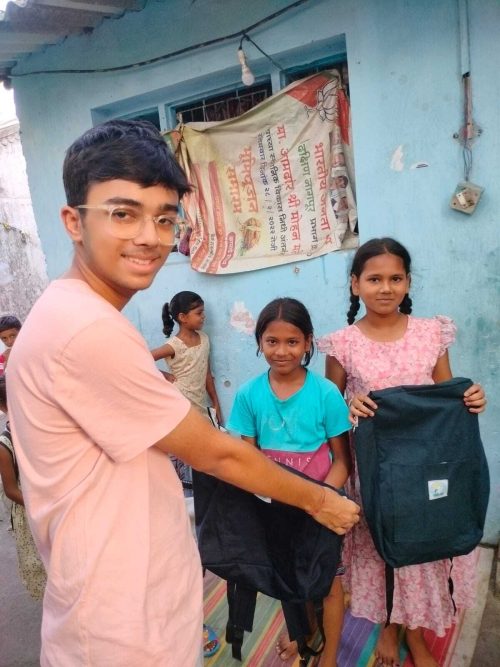
Each volunteer contributes meaningfully, whether by collecting textile waste, connecting with local schools, or distributing eco-friendly bags.
“We had three goals in mind when we started: to help children attend school during the monsoon season, reduce textile waste, and empower marginalised and disabled people,” he explains. “The first goal has already seen incredible results. Through our surveys, we found that attendance rates in government schools where we distributed the bags increased by 34%.”
The impact goes beyond just improving attendance. The team has distributed over 3,000 bags, saving over 70 million litres of water, preventing 58,000 kg of carbon emissions, and upcycling more than 3,600 kg of textile waste. These figures aren’t just numbers, they represent real change, opportunities, and hope for those involved.
Scaling up the mission: Threads4Good’s plans for the future
The 17-year-old initially funded the initiative using his personal savings, but he needed more funds to expand it. Currently, there are around 26 disabled individuals and 13 marginalised women working for the initiative. “We faced the challenge of fundraising because we needed money to pay the people who made the bags,” he explains. “We solved this problem with grants and award money.” Among the grants and awards that supported the project are the Diana Award (2024), the Ashoka Seed Prize (Rs 30,000), the International Young Eco-Hero Award (USD 1,000), and the Harvard Impact Initiative Award.
The young founder has ambitious plans for the future, including filing a Public Interest Litigation (PIL) to ensure that the government takes responsibility for ensuring proper attendance in government schools.
“Under the Right to Education Act, one of the key responsibilities of the government is to ensure proper attendance in schools, as well as the distribution of necessary stationery and facilities. Unfortunately, that is not being done. In the near future, we are striving to make sure these issues are addressed,” he says. “In the long run, we also want to introduce mid-day meals in government schools, so children don’t have to worry about where their next meal will come from.”
Through the hard work and dedication of Tejas, his volunteers, and the marginalised workers, Threads4Good has blossomed into a movement that not only addresses the issues of education and the environment but also creates a sense of dignity and independence for those who have been excluded from the mainstream workforce.
Reflecting on the journey, the teen founder humbly says, “It’s amazing to see how something so small can make such a big impact. I am glad I decided to start the initiative, but I was overwhelmed when I saw it garner so much attention among students and their parents. I’ve learned that the power of community is unstoppable, and I’m excited to see where this journey will take us next.”
Edited by Arunava Banerjee; All images courtesy Tejas Pugalia
No comments:
Post a Comment